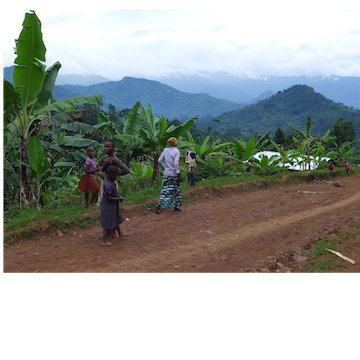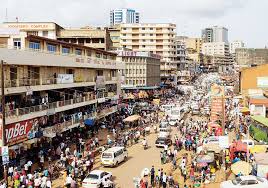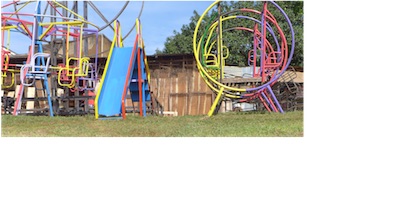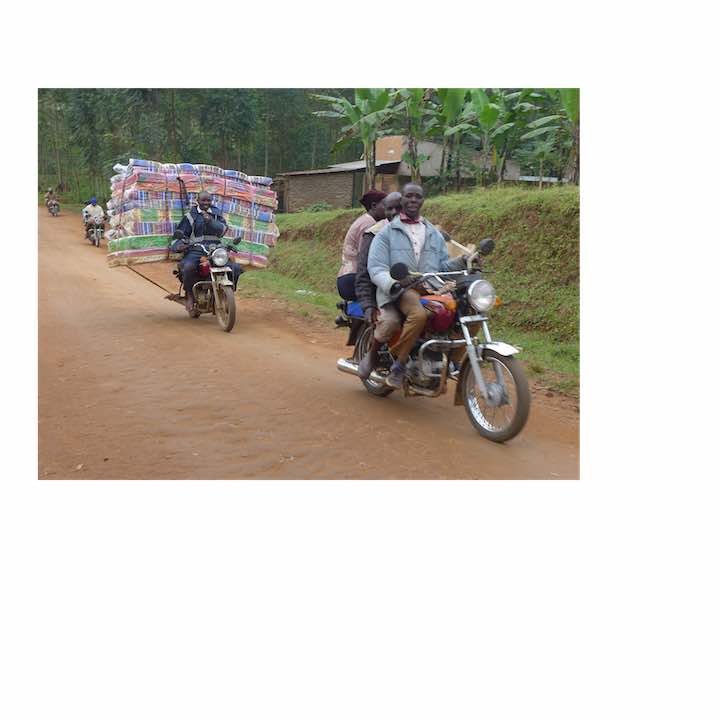
Uganda is a world of contrasts. In every way, the contrast between what is seen looking one way and what is seen on the opposite side of the road is a stark contrast, sometimes shockingly different. It is why writing this blog post has been a challenge. I don’t want to miss the African forest for the trees because my first impression is based on only seeing one side of the Ugandan shilling.

Kampala, the capital city of near two million people, can be seen as an urban nightmare or a vibrant, cosmopolitan mecca. Traffic is chaotic but road rage doesn’t seem to happen because everyone seems to understand the unwritten rules of the road. Architecture includes modern sky scrapers and wretched slums.

Color is everywhere. Inside shops vibrant fabrics are stacked floor to ceiling.

By the side of the road, bed frames and playground sets are offered in pink, sky blue and lemon yellow. The sidewalks are filled with men in dark, business attire and women wear richly patterned native dress.

The ride from Kampala to Bududa was an adventure in itself. Six people, Rashid, the driver, Robert, the Chief of the Learning Center, Barbara, Jim, Sheila, another volunteer, and I crammed into a minivan with eight, 50 pound suite cases, piles of fabric for the sewing classes, and a huge box of tools we had purchased for the carpentry class. The box of tools couldn’t fit; we stuffed tools under the seats, between legs, and any space that wasn’t already filled with body parts or luggage.

Driving out of Kampala is best described as crawling out of Kampala. Bumper to bumper for an hour and a half. The small motorcycles, called Piki Piki’s, weave between the somnambulant lanes of cars adding to the sense that you are moving backwards rather than making progress.
Our little van was stopped twice by the police. One stop was a routine check for the vehicle’s paper work. The other stop could have led to an arrest, a bribe, or a day lost in some bureaucratic warren.
I had been taking pictures out of the car window and had inadvertently aimed it in the direction of female police officer. She was very angry. This is a well-known breach of political etiquette to everyone but me. The police are not held in high regard in Uganda and they don’t like being photographed. When I turned off the camera, she was sure I was deleting some incriminating images. She took the camera and seemed to be on her way to disappearing forever. Fortunately, Rashid is both an excellent driver and a smooth talker. His soft-spoken exchange with the lady cop and a supervising officer dressed in an immaculate white uniform rescued my camera and allowed us to return to our journey.

There were an incredible number of “strip malls” of weather beaten, one-story shops selling everything from raw sides of lamb to rebar and lumber for your next construction project.
The ride through the countryside was relatively uneventful. Surprisingly, the roads were almost all paved. One section was built only two years ago by the Chinese. China is making a huge investment in Uganda. What the return will be on this investment likely includes access to recently discovered oil. Again, the contrasting sights along the way made the trip one surprise after another.

Next stop, Mbale, the largest town near Bududa that has a full-time vegetable market. It is Rashid’s hometown. He was greeted enthusiastically by everyone we passed and seemed to have license to park anywhere he deemed convenient. We bought avocados, pineapples, peanut butter, dish soap, and the precious toilet paper. Fitting our new treasures into the already over-packed minivan was another exercise in creativity and compression.
On to Bududa!!
Unfortunately, the dirt road to the village is paved with potholes interrupted by an occasional flat spot. We are seriously overweight, but there was little space for passengers or packages to bounce about. The landscape is filled with banana, mango, and avocado trees. The matoki, green banana-looking fruit is everywhere and a staple of the local diet.
Houses along the road and on the distant hillsides span the gamut from crude, stick and mud, one-room shacks to sparkling, freshly painted stucco compounds with steel gates at the entrance to the driveway. Transportation is rarely an automobile. There are small minivan buses that stop whenever wherever a passenger signals to stop. By law a Matatu can only carry 14 passengers, but apparently, the law does not address marketplace purchases, chickens or other reasons to choose a bus over walking.

The most frequently chosen mode of transport for people, products, or produce is small, single, cylinder motorcycle referred to a Piki Piki. A single passenger, a small family, huge bunches of matoki, lumber, mattresses, you name it, any load is fair game.

The Guest House where visitors stay is located about a mile and a half from the Learning Center. It is a comfortable home for weary visitors with a wonderful view from the porch and a much, appreciated toilet seat over the pit toilet.
More details, people, and surprises coming soon if my internet connection holds up. Another theme I will be exploring is “Whatever Works.” This can be applied to housing, transportation, diet, local bureaucratic policy, and coping with the life in a beautiful country with many challenges.
Thanks for reading.
I would like to suggest that if you are inclined to share a little of your relatively huge western wealth, please consider going to Bududa.Org to make a donation. I have benefited from many generous supporters, but the needs of the people of Bududa and the Learning Center a much more important. You could tell them Ron sent you or not, but what you pay for a Latte is more than most local people make in a day.
Wonderful post, Ron! I’m so happy to get this first update. And your pictures of the journey so far!
LikeLike
Wonderful commentary! What a life changing experience for you…and for us all.
LikeLike
Ron, what a wonderful experience I had through your shared words and images. I hope the rest of your journey is as rich and wonderful as it started. I look forward eagerly to your next posts.
LikeLike
Ron, Your thoughtful and colorful descriptions were very interesting to read … Took me out of my comfortable world. Thank you for helping to promote appreciation for and curiosity about their culture.
LikeLike
Vivid description, great pictures!
LikeLike
To Everyone who was kind enough to respond to my blog post, your comments are very much appreciated. Please forgive me if I don’t respond to each comment. The connection to the internet is not reliable and electricity works one day and then disappears for no obvious reason. Sunshine and the good will of the people I meet is much more dependable so all is well.
Ron
LikeLike
Ron, I found this blog fascinating and funny. I loved the pictures ! Anxiously waiting for the next blog.
LikeLike
You have described Kampala perfectly, I couldn’t have done it justice like you have. I enjoyed your blog a lot!
LikeLike